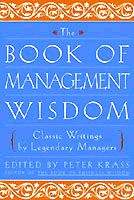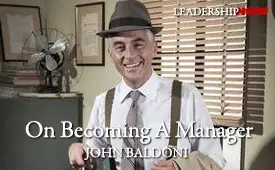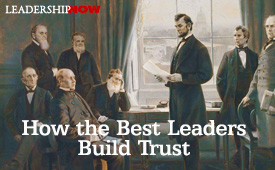
Management's Responsibility | Reading Room BY ANDREW W. ROBERTSON |
ANDREW W. ROBERTSON
Regarded as one of the shrewdest managers of his time, Andrew W. Robertson was recruited to become chairman of Westinghouse just as the Great Depression hit. Westinghouse had been founded by George Westinghouse in Pittsburgh in 1886. At the age of 22 he invented the air brake, and then pioneered work in electrical plants. The founder stepped aside in 1910 and died four years later, but the company continued to expand, entering the radio and appliance fields. At about the time that George Westinghouse was in the twilight of his career, Robertson was a school teacher, then a door-to-door salesman of aluminum pots and pans, after which he became an attorney for and then head of a utility holding company. When Westinghouse's chairman died unexpectedly, its directors sought outside help to revive the sluggish company; thus Robertson entered the scene. According to business analysts back then, Robertson inherited a stubborn company that was as "bulky as a hippopotamus." To liven things up, he organized an advertising department (a first for the company) and decentralized operations. Recognizing the opportunity that World War II presented, he guided the company into the military electronics business. In fact, Westinghouse radar equipment on Oahu warned of planes approaching Pearl Harbor on December 7, 1941; unfortunately the powers-that-be assumed they were American planes. For Robertson, who reigned from 1930 to 1946, management was to be glorified as it makes all things possible—whether it be selling a Fuller brush or running a railroad—and his deification of management is obvious in Management's Responsibility. While he covers a good deal of highbrow ground, his essay also includes humorous anecdotes and provocative thoughts. Robertson admitted that management must be strong and even dictatorial: "It is anti-democratic, although private organizations flourish best in democratic countries. However, the democratic rule of the majority will frustrate and defeat any management." In other words, he said, the majority is not always right. Management's Responsibility
Andrew W. Robertson Management is to be found everywhere, in our homes, in our personal affairs, in our factories and generally throughout all social functions, economical, political or otherwise. If a thing is thought to be devoid of management, someone is always popping up to inject a little management into it, such as making a managed currency or a wheat crop or managing the supply of cotton, the number of pigs and everything in general. Unfortunately, the various efforts of management do not always harmonize. In fact, more often than not the efforts of different managements are in conflict with one another so that if one management succeeds, the other must necessarily fail. The hunter of seals is directing all his managerial ability to kill seals. Government may be devoting all its managerial ability to keep the seals alive. Management has been in existence as long as civilization. But in the present age management controls larger groups than in any other age. It is only during the last fifty years that we have seen organizations of national and international scope. Today we think of management as the organizing force in the world of affairs. It is the know how of business and industry. It is concerned with order, discipline and accomplishment, and is against disorder and inertia. Management uses the intelligence, labor and wealth of man with the materials and forces of nature to produce things or services which other men want. It is absurd, in a sense, to define management to you, but in another sense it is a wise precaution to [ensure] our common approach to the subject. Management is the last and best means by which man, the builder and creator, takes the manifold riches of nature which, in their raw or natural state, are useless to him, and molds them to his needs. The distinction between the work of management and the work of an individual is that the results of management's activities are always for others. To survive, management must produce what others want, whereas the individual, more often than not, is concerned with producing what he alone wants. The multifarious activities of management are beyond description, and some of the activities might be called mismanagement. Management has been in existence as long as civilization. Management is necessary to sell a steamboat or a Fuller brush; to run a hat-checking concession or an automobile factory; to operate the Pennsylvania Railroad or a beauty parlor; to give a picnic or conduct a funeral. Management will function in Europe or Africa; but the higher the standard of living, the better management functions. Or restated, the better management functions, the higher the standard of living. Our attention is directed to that part of management which has to do with private enterprise. Management enables man to advance through the helpful cooperation of other men. Alone he is pitiful. At best he is little more than an animal and no matter how brilliant he may be he cannot rise far without the help of others. He is born naked and helpless. He travels but a short distance and is tired. His strength wanes unless he is fed. He may know much, but the wisest man has explored only a little bay on the shores of the great ocean of knowledge. Only in the union of minds under capable management does he become supreme. Management unites individuals in effective cooperation. The corporation is the modern vehicle for this purpose. Through it the widow's mite aids the laborer to produce what the consumer wants. Management acts as steward and trustee for all—investor, laborer, and consumer. The results are astonishing. The laborer has received the highest wages for the shortest hours. He has at last found leisure and has become a consumer. He now knows comfort and has luxury. He is unable to appraise his condition as there is nothing in all history with which to compare it.... The world is founded on faith and integrity of others. The goods and services of management are accepted generally upon their face value. I trust the men who make the automobile I buy, and I do not know any of the thousands who have contributed to the finished product. When I step into an airplane I trust my life to the organization which built it and to the pilot who operates it. When I receive a telegram I do not question the integrity of the message. Management must be honest, capable and wise, even as you and I, and its goods and services must be worthy of highest trust; but it must also accept the task of leadership in the conquest of our natural world. Man must combine his forces to win. Nature is relentless. It will reclaim every secret and recapture every stronghold our age has won unless we are alert to hold it and press on to new victories. It is pleasant to be complacent, but other civilizations as proud as our own have gone down, leaving only broken fragments to tell the story of their glory. Through wise management of our abilities and resources we have advanced far beyond any previous frontier, but what we have gained can be lost. And it will be lost, and retreat will be inevitable, if the attack against business succeeds in curbing management and killing initiative. Management has served best in free countries. The United States has been ideal for its development. Here the best talent is drafted from 50,000,000 workers. The managerial type of person is rare. It is not enough to be intelligent, industrious and trustworthy. The management of a great modern enterprise must have special courage, unusual foresight and a knowledge of psychology and human conduct beyond mere book knowledge. The necessary coordination and cooperation of thousands of different individuals, all alien of end and of aim, so that their diversified talents and knowledge are harmoniously directed to accomplish a definite thing, is no small task. Teamwork is what does it. It is easy to get cooperation, but more difficult to get coordination. August Bruski had a wife and a bright boy of 14 and an older daughter. The peace of the little family was almost wrecked over their willingness to cooperate and their failure to coordinate their efforts. The son won a place on the commencement program of his school. He knew his speech perfectly. The family was proud and happy until the night before the great day when the family decided the boy had no suitable clothes unless he could wear his father's trousers, which were six inches too long. The father wasn't willing to have the six inches cut off and the son was in tears at the thought of wearing them rolled up. However, it was decided, after long debate, that that was the best thing to do and the family retired—but not to sleep. The mother shared the horror of her son at the thought of those rolled up trousers and at last decided to get up and cut off the extra six inches, which she did. Meanwhile, the sister tossed and fretted in sympathy with her brother and finally she, too, decided to cut off the extra six inches in an effort to cooperate. So she got up and cut another six inches off the trousers. Cooperation without coordination will not make our pants fit. Good management is the rule of the best minds. Organizations controlled by management follow the rules laid down by Plato for the perfect society; namely, "the wisest have the most authority." It is anti-democratic, although private organizations flourish best in democratic countries. However, the democratic rule of the majority will frustrate and defeat any management. The crew cannot run the ship. It is popular to think that the majority is always right, but there is as much difference in feeling right and being right as there is in feeling good and being good. Management is impersonal. It must travel a narrow road. A friend was crossing one of the many bridges which span the Allegheny River in downtown Pittsburgh, when he was stopped by two robbers who demanded his pocketbook. My friend protested. The robbers replied that they wanted only what was right and fair and would be willing to submit the matter to a vote of the three of them and let the majority decide. With all solemnity the vote was taken and the majority won and my friend lost his pocketbook. Decisions in organizations under management are never made by weight of numbers. Every decision is made by those persons best qualified by knowledge to make it. Finally, all decisions of each qualified group or division are coordinated into the activity of the organization as a whole. Management is impersonal. It must travel a narrow road. The twilight zone of human frailties and error, which bounds all our acts as individuals, is denied it. Management may be kind, but not sentimental; liberal, not extravagant; frugal, not stingy. Higher things are demanded of management than we require of ourselves. . . . The modern world is complicated beyond belief. No one, not even the simplest citizen, lives what might be called the simple life. None of us can truly take care of himself. We depend entirely upon other people for the necessities and luxuries of our lives. Light comes to us over a wire. Heat through a pipe. Water through another pipe. We are carried to and from our work in public conveyances. Food is to be found around the corner if we can get the necessary nickels to purchase it, and, if we cannot, government has to furnish it or we perish. In such a world, the need of management is imperative. The minute the mob takes over the power plant the city is in darkness. Order and system, which are possible only through management, must prevail throughout the modern world. The managers of today, imperfect men as they are, are still the pick of all the candidates available and it is their responsibility to maintain the proper functioning of the vital necessities of our life. Management may not quit under criticism. It is not enough to stand up under criticism when one merits it; it is necessary to stand up and take it on the chin when one does not merit it. This is the law of good sportsmanship. It is the law of good society, and management must measure up to it. If anyone is the captain of our modern ship, management is. And it cannot desert its post. The collateral responsibilities of management are many. Large factories and mass production lead to congested living conditions and the inevitable lowering of health and morals. Management is not directly responsible for the social conditions which are the indirect result of its factories and production methods, but it must nevertheless accept a fair share of the responsibility for these indirect results. The rise of material well-being, which is everywhere apparent, was attained only at a price. The innocent victims of these conditions are helpless. They are the weak and the unfortunate and in every age have suffered ill health and have been poorly fed and poorly clad. But their condition, by proper attention, may be ameliorated and management must accept the responsibility for the amelioration. Just as it has long since accepted the responsibility of securing safe and healthful surroundings in which men work, it must now accept the responsibility of helping employees secure safe and healthful surroundings in which to live. Anything short of this is a neglect of clear responsibility. Since we live in an almost wholly artificial world, there would seem to be no escape from providing artificial or man-made aids to health. Parks and playgrounds must be furnished and a reasonable amount of outdoor life provided. The comfort and health of every community must receive constant attention. Finally, since management can exist only in an environment suitable to its needs, it must recognize its obligation to the society of which it is a part. In many cases society has decreed regulations and restrictions which hamper management and private enterprise, but society is the sole arbitrator of what it considers right, and management must conform. It has no choice. It is as helpless in the face of social restrictions as it is in the face of economic conditions. All management of private enterprise realizes that changing times affect business and may in time render it useless. The canal has gone. The horse and buggy have gone. The street railway and steam railroads are suffering from changed conditions, but management must accept these things and it must also accept proper governmental regulations. It is not enough to stand up under criticism when one merits it; it is necessary to stand up and take it on the chin when one does not merit it. This is the law of good sportsmanship. And inasmuch as government is forced by the very nature of things to assume a larger and larger role in our everyday life, regulating more and more what we do and how we live, it needs the assistance of management more than the government of any other age. Management should willingly offer its talents and services to government because management is the only source from which government can get the necessary talent to operate its many activities efficiently. It now ignores management, and management scowls at government. They are both wrong. Meanwhile the people suffer. Modern government cannot exist without better management. Management must accept its responsibilities and offer its services to any good government that asks for them. Government has a proper field of regulation which management recognizes and accepts. It is equally true that management has a field of accomplishment which government now lacks and would do well to recognize. The affairs of man move along with surprising speed and power. We see trade and commerce going on uninterruptedly between individuals and between groups of individuals, with ships crossing every sea and stopping at every port. It is obvious that a well ordered world is necessary for the growth of prosperity and that anything which interferes with the exchange of raw materials or the products of human labor tends to lower the standard of living, but it is not obvious that private enterprise is the mainspring of all our activities. The demagogue ignores private enterprise and considers it of no importance. The situation reminds me of my experience the other day in an airplane. I was sitting forward and looked out the window from time to time. Nothing but the wing obstructed my view. I could see the whole horizon and the ground below at an angle. I repeat, nothing obstructed my view; I could see clearly. I was alarmed when I realized that my view was directly across the end of the motor where there should be a propeller. But there was none. I mean I couldn't see one and as far as my eyes were concerned there was no propeller. If I had not known that I couldn't see a fast moving propeller, I might have assumed that airplanes move through the air by virtue of government regulations, or some mysterious power, without propellers. Sometimes I think we judge our civilization just as faultily. We see things moving along, goods being made, wages being paid, taxes being collected, human beings living and dying with a more or less steady rhythm, and we haven't any idea of what keeps things moving. We can't see the propellers of our civilization. The greater the speed of living, or the higher the standard of living, the less people comprehend it. Almost anyone can understand a horsepower civilization and the simple transactions which constitute its life. Grain is planted, harvested and sold; simple goods are manufactured and purchased. The complete round of life is clearly visible. But who among us can get a glimpse of the mechanism of this Kilowatt Hour Age, which is propelled through space almost as fast as the electric current which symbolizes it? Propellers we cannot see may be overlooked and neglected. Under such circumstances, when the wisest are at a loss, and it seems easier to be wrong than to be right, management must stand by its colors, struggling to maintain the cause of free enterprise in a world threatened with unwise regulation. Free enterprise may confidently hold up its head as representative of one of the most vital functions in our national economy today. It is the one thing which stands between us and a stale, flat, unhappy world of universal regimentation and individual conformity to a single pattern. 1940 Source: The Book of Management Wisdom: Classic Writings by Legendary Managers, PART I: Essential Qualities of Great Managers. ©2000 Peter Krass (Editor) . All Rights Reserved. Used by permission. |
|
 
The Persistence of Vision MICHAEL MCKINNEY 
On Becoming A Manager JOHN BALDONI 
Communicating with Power: Putting Leadership on Parade KEVIN DALEY 
How the Best Leaders Build Trust STEPHEN M. R. COVEY 
The Men Behind the Guns of Business RICHARD W. SEARS 
The Focus of Leadership MICHAEL MCKINNEY 
Why Leaders Fail MARK SANBORN |
 |
| ||
 | © 2019 LeadershipNow All materials contained in https://www.LeadershipNow.com are protected by copyright and trademark laws and may not be used for any purpose whatsoever other than private, non-commercial viewing purposes. Derivative works and other unauthorized copying or use of stills, video footage, text or graphics is expressly prohibited. |
||